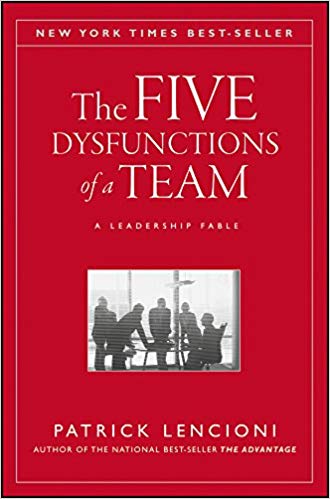

This article is an excerpt from the Shortform summary of "The Five Dysfunctions of a Team" by Patrick Lencioni. Shortform has the world's best summaries of books you should be reading.
Like this article? Sign up for a free trial here .
Are you looking for The Five Dysfunctions of a Team discussion questions? What are some of the key themes and ideas to discuss?
In The Five Dysfunctions of a Team, Patrick Lencioni explores how teams fail to work cohesively through the lens of the five-dysfunction model. Further, he gives advice on how to recognize and root out each dysfunction by working your way up the dysfunction pyramid.
To help you evaluate your team on each of the five dysfunctions, we’ve put together some discussion questions.
The Five Dysfunctions of a Team: A Leadership Fable Discussion
The Five Dysfunctions of a Team: A Leadership Fable explores how teams fail to work cohesively together through a dynamic, five-part model of dysfunction. The five dysfunctions are 1) absence of trust, 2) fear of conflict, 3) lack of commitment, 4) avoidance of accountability, and 5) inattention to results.
The following The Five Dysfunctions of Team discussion questions will help you analyze how your team fares on each of the five dysfunctions.
Testing Teamwork
By thinking about DecisionTech’s flaws, you can improve your effectiveness as part of a team.
- Have you ever been part of a team that was unable to work together and achieve its stated goals? How do you think you might have contributed to this dynamic?
- Can you think of a real-world example of a team (whether in sports, politics, business, or anywhere else) that was made up of talented individuals that were unsuccessful working as a group? What do you think were the reasons for this team’s failure?
- Of the characters in the book, which one most resembles someone you have trouble working with? Describe this person, and share an experience that frustrated you.
Digging Into Discomfort
These questions will help you identify sources of discomfort and examine why you might be holding back from your colleagues.
- Do you feel comfortable admitting your own weaknesses among your team? Why or why not? Describe a recent example.
- Do you have a hard time quickly and genuinely apologizing to your teammates when you’ve said something hurtful or destructive? Describe a recent situation.
- Do you generally find your team meetings to be boring because no one’s willing to disagree with each other? Describe a recent example.
- If you have these dysfunctions, let’s think about the root issue. Do you think that an absence of trust might be at the core of these problems? Are people unwilling to show their weaknesses because they’re afraid others will use that against them? Reflect on this and how it applies to your examples above.
Defining Disarray
Use these questions to see if you’re on the same page with your teammates.
- Do you know what your teammates are working on? Explain why knowing this is important.
- Can you think of a time where you had to personally hold a teammate accountable for not contributing to a shared goal? Describe the situation and what the hardest part about this was.
- Have you ever had to make an individual sacrifice in order to help achieve a team goal? Describe the situation.
Getting Comfortable with Conflict
Think about these questions to see how you can get more comfortable with your teammates.
- How much do you know about your teammates on a personal level? Do you find yourself working better with people when you know more about their lives?
- What’s one conflict from the past that you hold a grudge about? How can you bring this up and resolve it, in a safe environment, with the other people involved?
- How can your team build a safe, structured space for exchanging feedback and disagreeing? What’s an idea that you want to try in the next week?
Achieving Alignment
Use these exercises to help get on the same page with your teammates.
- Have you ever been part of a team where there was a lack of commitment around goals? After reading the section above, describe which strategy for overcoming this dysfunction would have been the best to use in this situation.
- Do you feel your team holds each other accountable for performance? Why or why not? If it’s not perfect, what dysfunction is preventing them from holding each other accountable?
- In thinking about your team in the future, what are clear, measurable goals you can set that will better define success or failure?
———End of Preview———

Like what you just read? Read the rest of the world's best summary of Patrick Lencioni's "Five Dysfunctions of a Team" at Shortform . Learn the book's critical concepts in 20 minutes or less .
Here's what you'll find in our full Five Dysfunctions summary :
- What the Five Dysfunctions are
- Why absence of trust is the fundamental dysfunction
- How to get people to argue the right way
- Strategies and exercises to overcome each dysfunction






